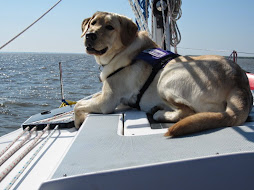 When we're choosing the dogs that will become service dogs, we have certain characteristics that we look for. Our dogs must be:
When we're choosing the dogs that will become service dogs, we have certain characteristics that we look for. Our dogs must be: - Adaptable
- Confident
- Friendly
- Polite
- Easy to live with
Dogs that exhibit these traits are much more likely to become successful service dogs.
Adaptable
Service dogs must be able to relax during downtime. While service dogs are working dogs, they do not have to work all the time. They do have play time and time to relax. Typically, downtime occurs when the partner or handler removes their treat pouch. However, some partners may not be able to remove their treat pouch or they may need to keep a cup of treats near them all the time. In that case, the dog must be able to recognize work time from relaxing time.
Dogs must also be able to easily adjust to new people, surroundings and events. No matter what environment they're in, they must be comfortable and not get excited or nervous. Their human partner depends on them for assistance, and in order to do that successfully, dogs must be able to ignore distractions and take everything in stride. A dog that gets stressed out in new environments may not be able to give their partner the support they need, while an even-tempered, adaptable dog will be able to continue working regardless of their surroundings.
Confident
As service dogs, our dogs will need to interact with people who may have unique mannerisms or use adaptive equipment. They must be confident when approaching and interacting with people. Service dogs must also be able to encounter any environment with confidence. For example, a balance dog assisting his partner to walk down a path cannot swerve to avoid a grate. A sudden movement may cause his partner to fall. Instead, he must be able to calmly and confidently walk over the grate while continuing to support his partner.
Friendly
As you might expect for a dog that's serving people, service dogs must be friendly and interested in people, and they should want to cooperate with their partner. However, we don't want our dogs to be so friendly that they leave their partner's side to greet people. Dogs need to have a balance of friendliness and self-control.
Polite
When you walk into someone else's house or room or borrow someone else's things, it's polite to respect their space and belongings. You wouldn't run pell-mell around their house or cause damage. Similarly, service dogs must respect people's space and belongings, including those of their partner.
Easy To Live With
One of the goals of a service dog is to assist their partner to become more independent. Their job is to make daily life easier, not more complicated. Service dogs should be quiet and save rough dog play for outside. They should get along with their partner's pets, whether dogs, cats or other animals. Dogs must stay off furniture and beds unless invited up. For the safety of both dog and partner, service dogs should also wait patiently when doors are opened rather than bolt right through. All of our service dogs are housebroken and will toilet on cue both on and off leash and on different surfaces. They must also be well-behaved even when they are not with their partner. They should be able to be left alone, uncrated, for at least two hours without disturbing the house.
These basic characteristics and behaviors, learned through extensive training, make a dog more likely to be successful on their journey to becoming a service dog. In our next post, we'll share some of the specific training our dogs go through to learn these appropriate behaviors and manners.









No comments:
Post a Comment